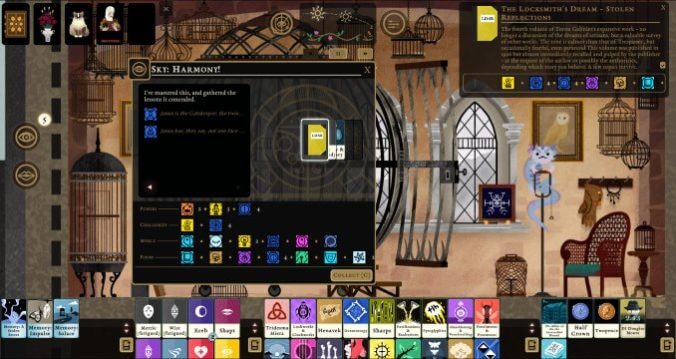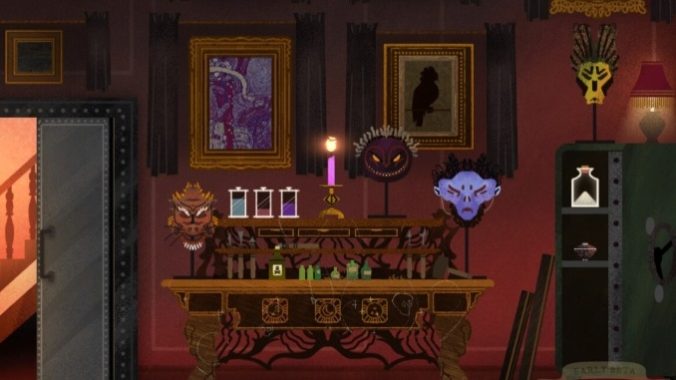Book of Hours is a game about doing your job.
This is a factual statement, and one I came into the game not expecting to investigate further. It’s not a strange choice; it’s easy to think of other games about doing jobs, including Wilmot’s Warehouse, Neo Cab, and Eliza, just off the top of my head. Furthermore, it’s a game about being a librarian, one of the most romanticized jobs there is. I expected Book of Hours to be about doing your job cozily, adventurously, joyfully. Instead, I found it to be about doing your job in a much more concrete sense: with danger, routine, and the stepladder of tasks I had to do never leaving me alone. It so defied my expectations, in fact, that it left me not just with comparisons to other games that depict doing a job, but asking why work is represented the way that it is in games—and if there might be another way.
Book of Hours is a narrative crafting RPG by Weather Factory, the team who made Cultist Simulator. You play as a librarian who washed up on the shore of a 1930s British town connected to a huge castle, inside which resides a library full of occult and historical information. You use cards to perform tasks, including reading books, opening rooms in the library, and talking with people in town. This eventually forms a loop where you read books to gain skills that help you read more challenging books, and where you open rooms with townspeoples’ assistance to reveal items that help you open further rooms.
This loop is immediately compelling, but you have to push through some confusion to get into it. The skill system, which involves plugging a card into another menu, accessed via your journal, in order to unlock stat bonuses, isn’t really explained. (For the curious: you make a skill by considering a “lesson” with an element of the soul and a memory; and you get a lesson by mastering, i.e. reading, a book at a desk. This actually makes sense if you’ve spent half an hour with the game.) The menus on menus will probably feel tame to anyone who played the studio’s previous title, but it was a balancing act for the first five hours or so, until I knew what I was supposed to do.
Your biggest task by far is reading. You read books to master them, learn lessons, and thereby improve your skills, to get better at reading books. To speak about this in terms of your job, your task is to give visitors what they desire: books with certain “levels” of mystery. When you’ve uncovered enough books, you have a plethora of options to give someone. I wished there was more flexibility with this early on, but as a former bookseller it really captured the experience of someone saying, basically, “I need the one with the yellow cover.”
I spent so much time reading in the side menu that I felt like I was studying for an exam. There were times I would ignore the weather cards popping up and the people I knew could help me with tasks. I wanted to uncover new rooms solely to read more books.
In an update on the game’s steam page, co-developer Alexis Kennedy wrote “I have a thing about there always being a core understated theme that the others orbit like an invisible sun. In Book of Hours, this understated theme is loneliness.” When you enter the town at the beginning of the game, you have exactly one friend, who becomes your introduction to everyone else. Almost all your time is spent alone. And the majority of that alone time is spent reading. From the many, many item descriptions in the library, it seems as though the previous eccentric inhabitants of the library felt much the same way. But you have no way to reach them; they are your predecessors, not your friends. And for me, playing the game eventually turned me back in on myself; I read and read, only calling a friend when I needed help to access another room, burrowing deeper into the library every day.
I also wanted to know who the librarian was, who had this beautiful, idealized job and treated it like an obligation. But of course, at the end of the day, that’s what a job is.

In my first session with Book of Hours, I was reminded of another game: the 1997 CD-ROM game The Jolly Postman. I don’t know for sure what made me think of it, but it might have been the sound effects of cards snapping into their slot, which sounds a lot like a repeated puzzle in the other game where you have to put objects back together from shattered pieces. But after I remembered this I couldn’t stop drawing parallels: both games are set in Britain, both are about being someone whose job is to help people get information from one place to another, they both have a post-person. I played The Jolly Postman so much, but forgot almost everything about it; watching a YouTube clip brought back memories buried deep in my brain.
Playing Book of Hours is a little like remembering how that game from 1997 felt to play—dreamlike. One of its five seasons, Numa, is the in-between time when things are forgotten and strange visitors show up at your cabin. Mechanically this means your memory cards, a crafting ingredient, all disappear, and the people who come to ask for your help become more exacting and precise in their requests. I went for a walk on Numa and found a recollection of the sky; I worked at the tavern and got so caught up in the job that I got sick. I woke up the next morning and rather than disappearing, all the consequences stayed with me.
A lot of what you catalogue in Book of Hours is not physical things but ideas and impressions. The tag for any picture in the library says “You could describe the whole house as a book, although it would be troublesome to index.” Your job doesn’t just involve reading books, but examining items, receiving smells and tastes that you then use to teach yourself something about the books you’ve returned to. Getting to work involves, eventually, not working; I hit a wall when I had to admit I needed to explore the town, seek out new forms of help and actually pay attention to the weather. Essentially, the game told me to touch grass.
Before I started Book of Hours I thought by “librarian RPG” it actually meant “dream job simulator.” While its structure is based on the joy of opening new rooms, and it gives you space to decorate and change as you see fit, I don’t think of this as an accurate description anymore. Book of Hours makes you believe that giving others what they want is your biggest goal. But even that is part of building up the library, because you get paid in a currency that can then be used to buy more books. The end of the game, which I haven’t reached yet, comes when you write your own “History”—the answer to the biography the game generates for you at the beginning. So your ultimate goal is to discover something about yourself within the library, and contribute your life to its catalog. But the thing that drives that goal is exploration of the place you’ve been fatefully tied to.
I’ve spent a lot of time in the past few years thinking about how game structures work. The trend of life sims that let you do a job cozily—run a bed and breakfast, for example, or open a coffee shop—isn’t one I can unilaterally criticize. It has its appeal, certainly for me (I gave Bear and Breakfast, which is a perfect example of this type of game, a high score last year). But these games come with a side of idealized capitalism; as the 4X game promotes expansionism, the business sim turns the grind into a fun collect-a-thon. Mundanities become obscured behind things like decorating, cooking, and customer service.
Book of Hours refuses to idealize work. It provides a beautiful setting and puts the librarian in an idealized role (who wouldn’t dream of washing up on the beach and being put in charge of a palatial library?). But it pushes back at the assumption that the player should treat this responsibility as something cozy. I failed at crafting, a lot; people stole my books and sometimes I couldn’t find anyone to help me. It’s relaxed, but weird; I had a great time playing it, but not uncomplicatedly. Something lurks beneath it always.
I found the slow pace, crafting focus and very detailed writing of Book of Hours compelling enough to keep playing for a long time. More than that, though, I consider it an example of what the “narrative crafting” genre can be if it thinks more expansively. Rather than being a small business simulator, or a cozy dream job simulator, it’s a loneliness simulator—or rather, a game that shoves a lonely narrator into a position where they have to stop thinking about themselves. (And really, how much loneliness comes from incorrect assumptions about our importance to others?)
While the endgame is to write your own History, the actual game is uncovering another history that existed long before you and will exist long after. The scale of one human life, it turns out, is nothing in comparison to a book. And yet, your experiences become an essential ingredient in cataloging books and reconceptualizing your life story. By making the cards you play with memories, personality traits, and life lessons, Book of Hours treats interpretation and study as routes to the self—routes that must eventually go through others.
Emily Price is a former intern at Paste and a columnist at Unwinnable Magazine. She is also a PhD Candidate in literature at the CUNY Graduate Center. She can be found on Twitter @the_emilyap.

